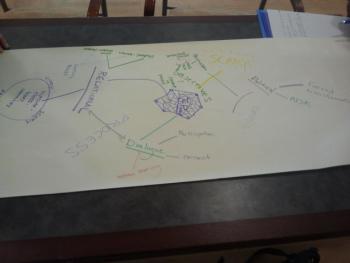Serendip is an independent site partnering with faculty at multiple colleges and universities around the world. Happy exploring!
Transformative pedagogy

As many of you know, I missed class this past Thursday and Friday to go to the annual Peace and Justice Studies Association meeting, which was being held at Tufts. The whole conference was really great and picked up on so many themes that we’ve been discussing in all three classes. In particular, a session called “Living Our Way Into the Answers: A Workshop on Transformative Pedagogy” really tied in to what we’ve been doing in class. The workshop was really interesting because out of the 30 or so participants, it ended up being split relatively evenly between students and professors. So, while much of the conversation about what transformative pedagogy means for students echoes the things we’ve been talking about amongst ourselves, hearing the teacher-perspective was really fascinating. Beyond the obvious conversation about how to introduce radical pedagogy in a system obsessed with learning objectives and outcomes was the emotional drainage many professors felt – like they just didn’t have the energy to be “transformative” anymore. This is something I haven’t really thought of in terms of my own professors or my friends who aspire to be transformative teachers one day. I also talked about our 360, and got a lot of questions from interested professors about what it’s been like.
As part of the workshop we split into groups, and I ended up being with a student from Wellesley, a professor from Hawaii Pacific University, and a professor from Nebraska Wesleyan. A lot of our conversation related to the Delpit piece – the professors stressed how first-generation college students from lower socioeconomic backgrounds are often just looking for the tools they’ll need to get a good job when they take a college course. The big question we had, of course, is where is the line between giving people the cues they need to succeed, while still allowing them to see problems within the system and possibly inspiring them to work to change it. We never really came up with an answer. But, it was refreshing to see that so many people outside of our small class (there were actually students and professors from around the world at the workshop) are asking the same kinds of questions about privilege and pedagogy.
My group also made a web of transformative pedagogy, which I’ve shared below.



